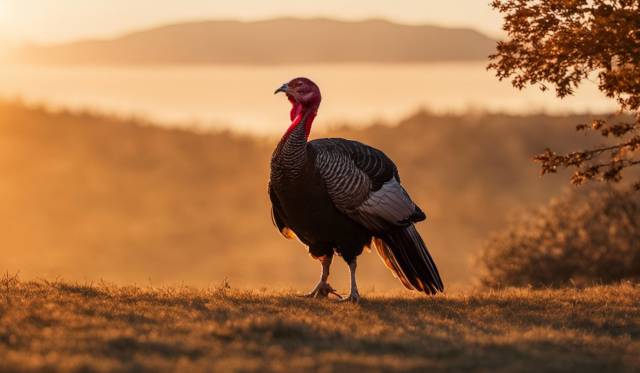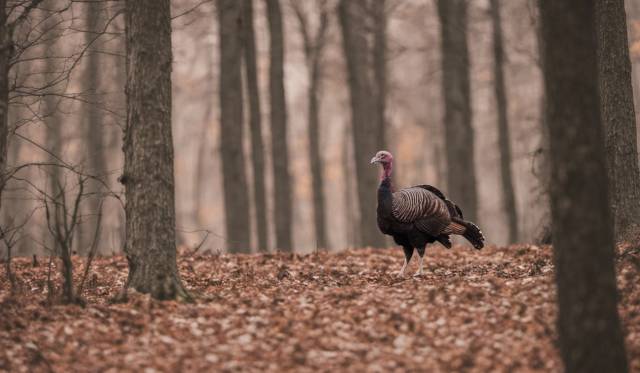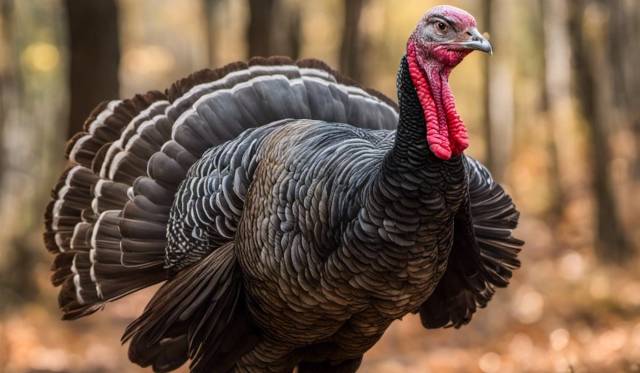Turkeys are fascinating birds that have been the subject of much debate among hunters and scientists. One of the most common topics surrounding turkeys is their sense of smell. Can turkeys smell?

Contents
Do Turkeys Have A Good Sense Of Smell
Yes, turkeys can smell, but their sense of smell is not as well-developed as their other senses, such as vision and hearing.
Turkeys have a weak sense of smell compared to humans. Observational studies have been done where biologists would test turkeys with piles of corn that contained mothballs or other strong-smelling items. The off-putting smell from these items did not deter turkeys from eating the corn.
This indicates that turkeys have a poor sense of smell, but that does not mean that they cannot smell. Turkeys can still detect certain odors, especially those associated with danger.
Can Turkeys Smell You
Yes, turkeys can smell you, and turkeys can detect human odors, but they are not very good at it. Their olfactory capabilities are limited compared to other animals, but they do have some ability to smell and recognize different scents.
While it is true that turkeys are capable of detecting human odors, their sense of smell is not as well-developed as other turkey’s senses, particularly their vision. Wild turkeys have a very keen sense of vision and are able to see and process visual data very quickly. As a result, they are more likely to be cautious or scared off by the sight of a human or the movement of a hunter rather than by their odor.
Turkeys do react to human odor to some extent. However, it is unlikely that a wild turkey would be scared off by a human’s odor alone unless the human was wearing a particularly strong or unusual scent.

Can Turkeys Smell Cigarette Smoke
Turkeys can smell you, so they can definitely smell cigarette smoke. They just may not know what cigarette smoke is or associate it with humans. The sight or smell of smoke may alert turkeys to the presence of something unfamiliar and cause them to be cautious. Turkeys are naturally wary animals that are always on the lookout for potential threats, and any unusual sights or smells in their environment may trigger their flight response.
For this reason, it is important for hunters and wildlife enthusiasts to be mindful of their surroundings and avoid behaviors that may startle or alarm turkeys, such as smoking or using strong scents.
Understanding Wild Turkey Senses
Turkeys, like humans, have five senses: sight, hearing, smell, touch, and taste. However, according to The National Wild Turkey Federation, turkeys rely more heavily on their sense of vision than any of the other senses.
Despite the fact that turkeys have a poor sense of smell, they can still detect basic flavors like sour and sweet, acidic flavors, or bitterness through their taste buds. Turkeys have fewer taste buds than humans, which may explain why they have a less refined sense of taste.
Turkeys have a well-developed sense of hearing, which allows them to detect the slightest sounds in their environment. Wild turkey’s hearing allows a turkey to potentially hear sounds up to a mile away and can even determine the direction from which the sound is coming. This is an important survival mechanism for turkeys, as it allows them to detect predators from a distance.

Turkey Olfactory Lobes
The olfactory lobes are a part of the brain responsible for processing smells and odors. In turkeys, the olfactory lobes are relatively small and underdeveloped compared to those of other animals. This suggests that wild turkeys have a limited sense of smell and may rely more heavily on their other senses, such as vision and hearing, to navigate their environment.
Despite their underdeveloped olfactory sense, turkeys are still capable of detecting and reacting to a range of smells in their environment. Turkey’s sense of smell is not as well-developed as its other senses and is not typically a primary means of communication or navigation for these birds.
Can Wild Turkeys Smell
Overall, turkeys have a poor sense of smell, a well-developed sense of sight and hearing, and a less refined sense of taste.
These senses help them navigate their environment, detect predators, and helps them with locating food.
Do Turkey Smell Other Turkeys
Turkeys do produce a scent, but it is not a strong or easily detectable odor. The scent is produced by an oil gland located on the turkey, which secretes a waxy substance that helps to waterproof the feathers. This substance has a mild, musky scent that is not typically noticeable to humans.
While turkeys may not produce a strong or distinctive scent, they are still capable of detecting and reacting to a range of smells in their environment. Their sense of smell may play a role in their foraging behaviors, as they are able to detect the odor of food items such as insects, nuts, and seeds.
Additionally, some studies have shown that turkeys can recognize the scent of other birds and use this information to identify potential mates or rivals.

Wild Turkey Hunting And Their Poor Sense Of Smell
As a hunter, I know that understanding the senses of your prey is crucial to a successful hunt. When it comes to wild turkeys, their senses are finely tuned to detect any sign of danger. Turkey sense of smell is not as acute as their eyesight or hearing, but it still plays a role in their survival.
To increase your chances of success while turkey hunting, it’s important to take steps to control your scent. Turkeys can detect human odor. This means that even if you are wearing camouflage and staying motionless, your scent can still give you away.
One strategy for scent control is to use scent-masking clothing. While wild turkeys don’t have a strong sense of smell, it’s still important to minimize any human odor that may be present. Another strategy is to play the wind. By staying downwind of your prey, you can reduce the chances of them detecting your scent.
